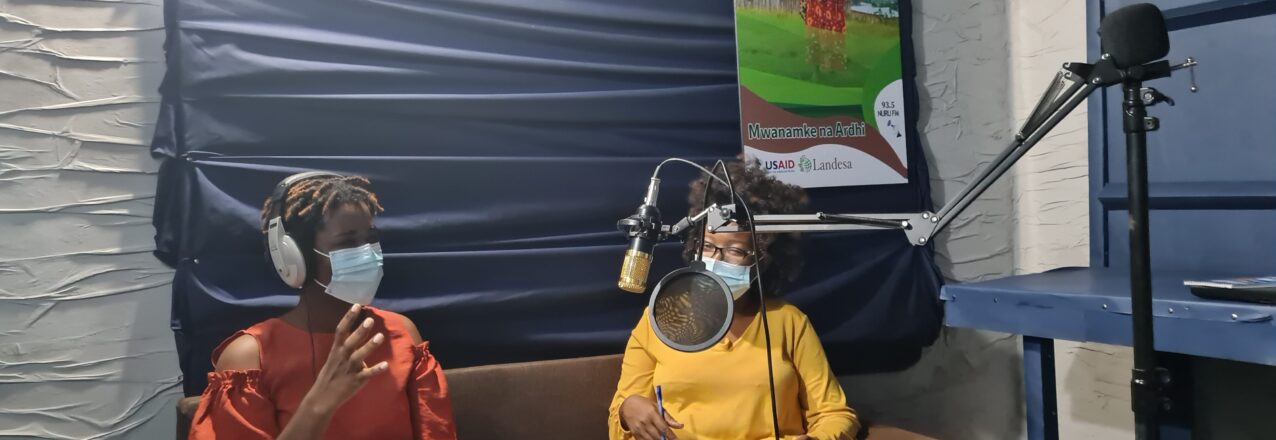By: Tasha Heidenrich, Landesa Tanzania
In July 2021, listeners tuned in to hear the debut radio broadcast entitled, “Mwanamke na Ardhi,” or “Women and Land,” a radio program on Nuru FM, a local station in the Iringa region of Tanzania. The radio program is supported by USAID’s Land Evidence for Economic Rights, Gender and Equality (LEVERAGE) activity, which focuses on strengthening women’s land rights and women’s access to credit in Tanzania. This particular radio activity is being implemented by local partner Landesa in Tanzania.
Although rural women in Tanzania have the same legal rights to land as men, they are not always aware of these rights. For example, women may not realize they have a right to be listed on land certificates along with their spouses; or, if they are the head of their household, to claim land certificates in their own names. In certain cases, local customs and harmful gender norms discriminate against women and prevent them from realizing their land rights.
To address these problems, the “Women and Land” radio program will be broadcast throughout Tanzania over the coming 10 months. Each month, the program will cover a new topic related to women’s land rights, ranging from exploring the rules related to inheriting property to women’s roles in governance. Each radio segment will be complemented by a live question and answer session to give listeners the opportunity to actively engage around the topic of women’s land rights.
National radio programming, which will cover the same topics in a condensed format, will begin this fall 2021. These programs will be broadcast on a national radio station that is popular with Tanzanian officials and other influencers. Many of the radio segments were developed in partnership with local representatives and officials to ensure that they are timely and relevant to local audiences.
Why Women’s Land Rights?
Improving land rights for rural women can yield large benefits, not only for the women themselves, but also for their children, their community, and for the environment. Research shows that when women have stronger land rights, they invest more in their land, invest more in their children’s health and education, and use more sustainable farming methods that can increase both crop yields and household income.1,2,3,4 Importantly, some research also shows that women with clear, documented land rights are less likely to experience domestic violence.5,6
By sharing information with rural Tanzanians, including those in leadership positions, about women’s land rights – while also trying to move the needle on the local practices that can stand in the way of women’s ability to exercise their legal rights – the radio program works to increase awareness about women’s land rights and improve the enabling environment for women’s land rights throughout Tanzania.
Why Radio?
Radio programming is an effective tool for education and behavior change in Tanzania as it is by far the most popular form of media throughout the country. It is made freely available to its audiences, has a wide reach that includes the country’s most remote areas, and is a popular source of news and information for men, women, and youth. In addition, radio is accessible to illiterate populations, and is a safe and practical way to communicate to the public during the COVID-19 pandemic. The interactive portion of the “Women and Land” radio program will directly engage its audience, bringing practical concerns to light, and make the information relevant and actionable.
By increasing Tanzanians’ knowledge about women’s land rights, “Women and Land” aims to help shift attitudes and behaviors around this important topic. By openly and widely disseminating information about the benefits that women, their families, and communities gain from women owning land in Tanzania, the radio program hopes to give women confidence to become more engaged in decision-making pertaining to land, and to encourage women, men, and local and national leadership to actively advocate for equitable land rights practices across Tanzania.
***
LEVERAGE is administered under the USAID Communications, Evidence, and Learning project and is implementing programs, research, and evaluations to increase women’s land rights.
References
1Ali, D.A., Deininger, K. and Goldstein, M., 2014. Environmental and gender impacts of land tenure regularization in Africa: Pilot evidence from Rwanda. Journal of Development Economics, 110, pp.262-275.
2Allendorf, K., 2007. Do women’s land rights promote empowerment and child health in Nepal?. World development, 35(11), pp.1975-1988.
3Bezabih, M., Holden, S. and Mannberg, A., 2016. The role of land certification in reducing gaps in productivity between male-and female-owned farms in rural Ethiopia. The Journal of Development Studies, 52(3), pp.360-376.
4Santos, F., 2014. Can microplots contribute to rural households’ food security? Evaluation of a gender sensitive land allocation program in West Bengal, India. GAAP Case Study.
5Grabe, S., 2015. Participation: Structural and relational power and Maasai women’s political subjectivity in Tanzania. Feminism & Psychology, 25(4), pp.528-548.
6Meinzen-Dick, R., Quisumbing, A., Doss, C. and Theis, S., 2019. Women’s land rights as a pathway to poverty reduction: Framework and review of available evidence. Agricultural Systems, 172, pp.72-82.


